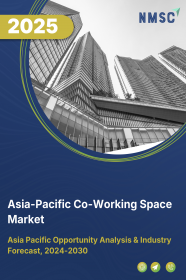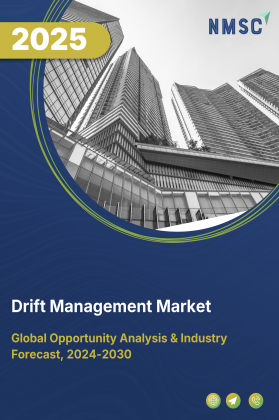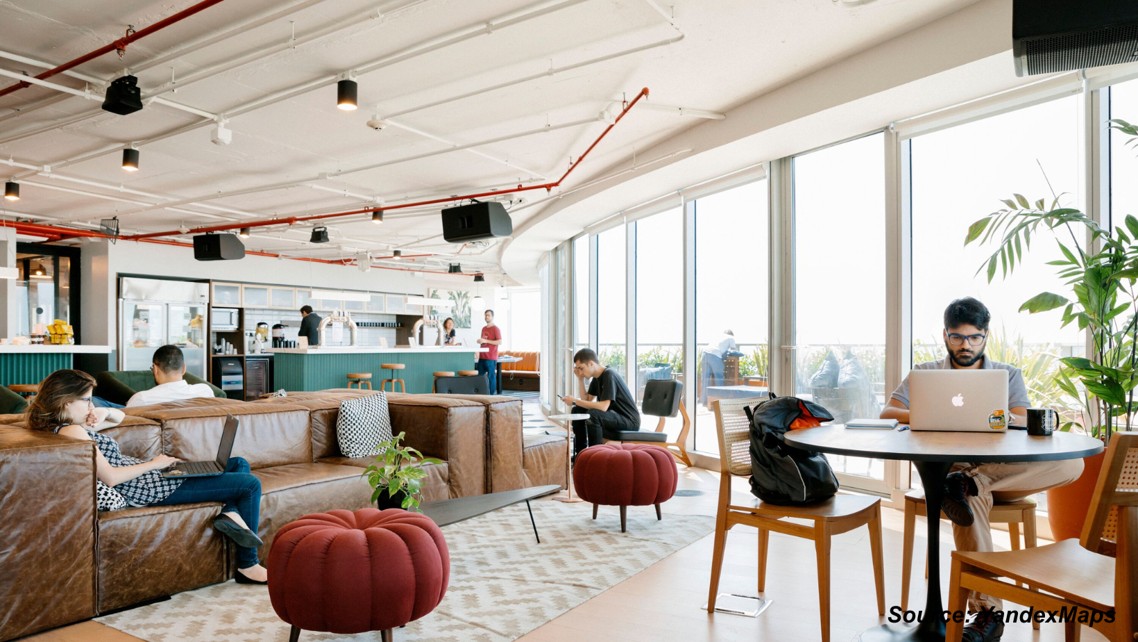
Asia-Pacific Co-Working Space Market by Space Type (Shared Open Spaces, Enclosed Private Suites, AND Others), by Membership Type (Hot Desks, Dedicated Desks, and Others), by Business Type (Standard Coworking, and Others), by Business Model (Direct Ownership/Operation, Franchise/Partnership, and Others), by End User (Freelancers/Remote Workers, and Others), by Industry Vertical (Technology & IT Services, Financial & Professional, and Others)–Opportunity Analysis and Industry Forecast, 2024–2030.
Industry: ICT & Media | Publish Date: 19-Sep-2025 | No of Pages: 239 | No. of Tables: 181 | No. of Figures: 126 | Format: PDF | Report Code : IC2034
Market Overview
The Asia-Pacific Co-Working Space Market size was valued at USD 3.09 billion in 2023, and is predicted to reach USD 11.82 billion by 2030, at a CAGR of 21% from 2024 to 2030. Co-working space represents a dynamic and adaptable solution to the evolving needs of businesses. These shared work environments offer flexibility in lease terms and space requirements, appealing particularly to startups and small enterprises seeking to avoid the upfront costs associated with traditional offices.
The communal atmosphere encourages networking and collaboration among professionals from diverse fields, fostering innovation and creativity. Equipped with modern amenities and strategically located, co-working spaces provide cost-effective, scalable, and accessible alternatives for companies seeking a central presence without the constraints of long-term leases. The industry has experienced significant growth as businesses recognize the benefits of this model, embracing the collaborative opportunities and resource-sharing inherent in managed workspaces.
Hybrid Work Normalization Accelerates Corporate Flex Space Adoption
Organizations across Asia-Pacific are embracing hybrid work as more than a temporary shift—it has become a strategic norm. Many companies in the region have stabilized office attendance, and a significant proportion plan to increase their use of flexible workspace as part of their real estate portfolios to support hybrid operations. Flexible managed offices are emerging as critical tools for firms that require scalable space solutions, enabling them to maintain productivity while reducing long-term lease commitments. As a result, coworking environments—with features like shared desks, collaborative zones, and agile memberships—are increasingly embedded in corporate real estate strategies across major Asia-Pacific markets.
Smart Space Demand And Niche Specialization Drive Operator Innovation
The coworking sector in Asia-Pacific is evolving beyond traditional setups, with operators investing heavily in advanced workspace technologies and specialized formats. There is a clear shift toward smart environments equipped with IoT sensors, AI-driven space optimization, contactless access, and data analytics to enhance user experience and operational efficiency. Additionally, specialized coworking formats—targeted at sectors such as fintech, healthcare, creative industries, or specific demographics like women entrepreneurs and digital nomads—are emerging as a powerful differentiator and growth enabler across the region. These developments not only attract niche communities but also support deeper ecosystem engagement and client loyalty.
High Real Estate Costs And Lease Volatility Pressure Operator Profitability
Despite strong demand for flexible workspaces, coworking operators across Asia-Pacific face rising real estate costs and volatile lease structures in prime business districts. In cities such as Singapore, Hong Kong, Sydney, and Tokyo, high commercial property prices increase the financial burden on operators, making it challenging to sustain competitive pricing for users while maintaining profitability. Furthermore, landlords in premium locations often favor short-term or revenue-sharing contracts, which expose operators to fluctuating rental expenses and demand cycles. These pressures limit the scalability of coworking models and create significant operational risks, particularly for small and mid-sized providers competing against global players with stronger capital backing.
Integration Of Coworking Spaces Into Smart City And Sustainability Initiatives
Asia-Pacific governments are accelerating investments in smart city development and green infrastructure, creating a fertile environment for coworking operators to position themselves as sustainability-focused workspace providers. Cities such as Singapore, Seoul, and Melbourne are embedding flexible work hubs within mixed-use urban districts that emphasize energy efficiency, digital connectivity, and low-carbon mobility. This opens avenues for coworking brands to collaborate with public and private stakeholders on net-zero office designs, smart energy management, and community-centric innovation hubs. By aligning offerings with ESG goals and urban sustainability agendas, operators can tap into institutional funding, attract environmentally conscious tenants, and secure long-term relevance in the evolving urban landscape.
India Dominates the Asia-Pacific Co-Working Space Market Share
India's prominent standing in the global coworking industry share, ranking second worldwide, is a testament to its thriving entrepreneurial ethos and governmental backing. With nearly 10% of the world's coworking spaces situated in India, closely trailing the U.S., the country's coworking landscape cultivates a dynamic environment for burgeoning entrepreneurs. Government-led initiatives aimed at stimulating economic growth serve as catalysts for the expansion of coworking spaces, fostering an ecosystem conducive to startup prosperity. This official endorsement propels market momentum, drawing in entrepreneurs and nurturing innovation across diverse sectors.
Furthermore, India's vibrant technology startup ecosystem significantly fuels the demand for coworking spaces. Boasting over 112,000 Department for Promotion of Industry and Internal Trade (DPIIT)-recognized startups across 763 districts, India ranks as the third-largest startup ecosystem globally.
Moreover, the nation boasts 111 unicorns with a cumulative valuation exceeding USD 349.67 billion. The emergence of new unicorns, totaling 45 in 2021 and 22 in 2022, underscores the robust growth trajectory of the startup landscape, intensifying the demand for coworking spaces. As startups continue to proliferate and scale their operations, the necessity for WaaS solutions becomes increasingly pronounced, solidifying coworking spaces as indispensable elements of India's evolving entrepreneurial landscape.
Thailand to Witness Substantial Growth in the Asia-Pacific Co-Working Space Market
Thailand's burgeoning startup ecosystem, centered primarily in Bangkok, necessitates adaptable and cost-effective workspace solutions to accommodate the expanding entrepreneurial landscape. Ranked 74th globally in StartupBlink's 2023 report, Bangkok's status as a burgeoning startup hub underscores the pivotal role of coworking spaces in nurturing innovation and supporting entrepreneurial ventures.
These spaces offer affordable alternatives tailored to the requirements of emerging enterprises, providing accessible and collaborative environments conducive to innovation and development. As Bangkok solidifies its position as one of Southeast Asia's most robust startup ecosystems, the demand for coworking spaces is anticipated to escalate, driven by the necessity for flexible workspace solutions that address the dynamic needs of startups and emerging businesses.
Simultaneously, the rising prominence of remote work culture in Thailand is reshaping workspace preferences among professionals, fueling the uptake of coworking spaces. With a growing number of professionals and freelancers seeking productive and flexible work environments beyond traditional office confines, coworking spaces provide dedicated workspaces and collaborative settings ideally suited for remote work.
These spaces afford professionals the flexibility to work autonomously while fostering a sense of community and collaboration. As remote work gains traction in Thailand, coworking spaces are poised to play a pivotal role in meeting the evolving demands of professionals, driving the demand for adaptable and versatile workspace solutions nationwide.
Competitive Landscape
The Asia-Pacific co-working space industry comprises of various companies including IWG (Regus And Spaces), WeWork Inc, The Executive Centre Limited, Servcorp Limited, The Flexi Group Limited, JustCo Pte. Ltd., Blue Pebbles, Awfis Space Solutions Limitedx, Fabbit, BHIVE Workspace, Corporate Edge, Workafella, IKeva, Work Club Global, UrbanShares and others.
Asia-Pacific Co-Working Space Market Key Segments
By Space Type
-
Shared Open Spaces
-
Enclosed Private Suites
-
Virtual Office Solutions
-
Event/Meeting Facilities
By Membership Type
-
Hot Desks
-
Dedicated Desks
-
Private Office Leases
-
Hybrid Flex Passes
By Business Type
-
Standard Coworking
-
Premium Managed Offices
-
Niche/Specialized Spaces
By Business Model
-
Direct Ownership/Operation
-
Franchise/Partnership
-
Real Estate Collabs
By End User
-
Freelancers/Remote Workers
-
Startups (<10 Employees)
-
SMEs (10–250 Employees)
-
Large Enterprises (>250)
By Industry Vertical
-
Technology & IT Services
-
Financial & Professional
-
Healthcare & Life Sciences
-
Manufacturing & Logistics
-
Public Sector & Education
-
Others
By Country
-
China
-
Japan
-
India
-
South Korea
-
Australia
-
Indonesia
-
Singapore
-
Taiwan
-
Thailand
-
Rest of Asia-Pacific
Key Players
-
IWG (Regus And Spaces)
-
WeWork Inc
-
The Executive Centre Limited
-
Servcorp Limited
-
The Flexi Group Limited
-
JustCo Pte. Ltd.
-
Blue Pebbles
-
Awfis Space Solutions Limitedx
-
Fabbit
-
BHIVE Workspace
-
Corporate Edge
-
Workafella
-
IKeva
-
Work Club Global
-
UrbanShares
REPORT SCOPE AND SEGMENTATION:
|
Parameters |
Details |
|
Market Size in 2023 |
USD 3.09 Billion |
|
Revenue Forecast in 2030 |
USD 11.82 Billion |
|
Growth Rate |
CAGR of 21.0% from 2024 to 2030 |
|
Analysis Period |
2023–2030 |
|
Base Year Considered |
2023 |
|
Forecast Period |
2024–2030 |
|
Market Size Estimation |
Billion (USD) |
|
Growth Factors |
|
|
Countries Covered |
10 |
|
Companies Profiled |
15 |
|
Market Share |
Available for 10 companies |
|
Customization Scope |
Free customization (equivalent up to 80 working hours of analysts) after purchase. Addition or alteration to country, regional, and segment scope. |

















 Speak to Our Analyst
Speak to Our Analyst

























